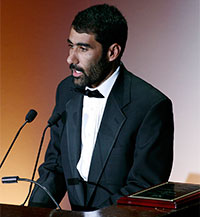Danish Karokhel, who won a CPJ International Press Freedom Award in 2008, messaged this morning concerned that the news agency he runs, Pajhwok Afghan News, and some other media outlets have been referred to the Attorney General’s Office by the Ministry of Information and Culture for reporting on an alleged bribery scandal involving a member of Parliament. The action was taken by the ministry’s Media Monitoring Commission, and could lead to criminal charges.
The May 24 story that angered the ministry revolved around unnamed government officials claiming that Iran paid large bribes to Wolesi Jirga member Hazrat Ali, encouraging him to organize parliamentary opposition to approval of the strategic cooperation agreement between Afghanistan and the United States. The Wolesi Jirga (Assembly of the People) is the lower house of Afghanistan’s Parliament. On May 25, the Afghan-U.S. pact was approved, and on May 26, Pajhwok ran Ali’s robust denial of accepting the Iranian money, which Pajhwok and other media said ran to $25 million. Pajhwok had already run the Iranian Embassy’s denial of the accusation in its earlier item.
This is just the sort of story that makes media so important in emerging democracies like Afghanistan. Corruption and allegations of corruption in the country are commonplace, and the political motivations of the accusers and accused make for murky circumstances. Making the attempt to report fairly on them should not mean that journalists run the risk of possible civil or even criminal charges, should it come to that. But there are few rules to play by.
In early May, the government published its most recent draft media law. The first was introduced in 2003, followed by versions in 2007 and 2011. And in January 2008, we wrote to President Hamid Karzai after he declined to endorse the proposed 2007 media law that had been debated by a joint commission of the upper and lower houses of parliament, after getting input from journalists and media commentators. We said the new law represented a promising step toward reaffirming media freedom. It was a step that was never taken, and subsequent drafts have tended to grow more restrictive.
There is cause for unease for the future of Afghan’s media, as for much else in Afghanistan as NATO forces prepare for withdrawal. In the country’s review in the 2011 edition of our annual Attacks on the Press, we pointed out that, while international aid organizations continued to pump resources into developing local media, many Afghan outlets faced severe challenges in sustaining their work.
In its own analysis of Afghan media, Pajhwok wrote:
The prospects for Afghan media are fraught with uncertainty as the country prepares for the withdrawal of international forces in 2014. Consumer markets are still too weak to support the level of advertising necessary for sustainability, and the prospect of post-withdrawal recession will only deepen the threat to outlets’ viability. At the same time, the cost of labor, operations, and basic reporting have all skyrocketed. Print, radio, and television outlets have been forced to shrink their news coverage, and vital information never reaches Afghan citizens because media outlets can’t afford to report it.
In the past few weeks, I’ve spoken with several other media organizations in Afghanistan, and some of the international organizations that support them. Few were willing to speak as frankly on the record as Pajhwok, but most alluded to similar difficulties.
And it’s not just the economics that are worrisome. Some of the news organizations that look most likely to survive are those set up by political or religious leaders and sometimes called “warlord media” (maybe an unnecessarily politically loaded term–one person’s warlord is often another’s political faction leader). What is really under threat is the effort to create a non-partisan national media for Afghanistan where news organizations make the attempt to operate neutrally, trying to meet the ideals of a free and independent press.
Despite the terrific efforts of some local journalists and international organizations to build Afghan media since the Taliban’s removal from power in 2001, without continued economic support, more professional training, and a more concentrated effort from Afghan journalists to organize themselves into resilient national professional organizations, all those efforts could disappear, with or without a national media law.
